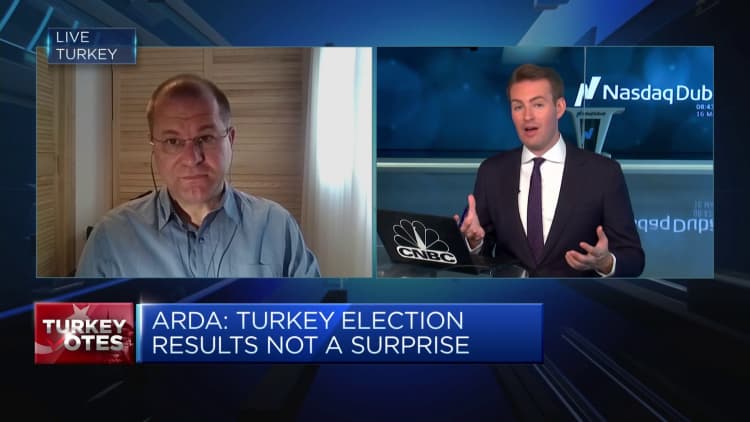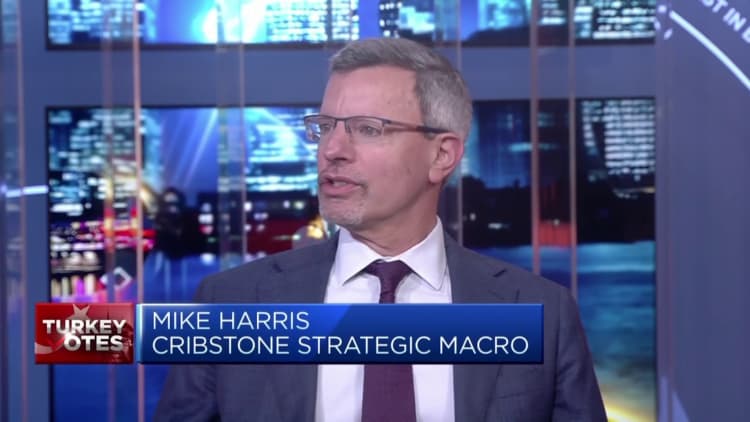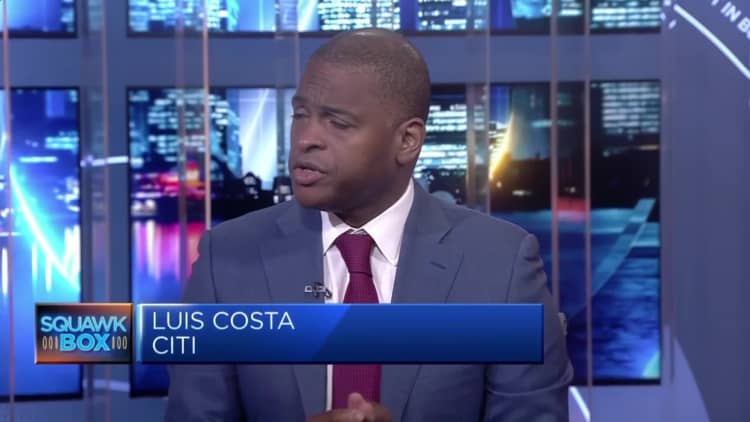13th presidential candidate and Republican People’s Party (CHP) Chairman Kemal Kilidaroglu (left) and President of the Republic of Turkey and Justice Development Party (AKP) Chairman Recep Tayyip Erdogan (Right) A campaign poster is displayed.
Tunahan Turhan | Sopa Pictures | Light Rocket | Getty Images
The results of Turkey’s first round of presidential elections are a blow to the opposition, which is pinning its hopes on toppling President Recep Tayyip Erdogan who has been in power for 20 years.
Contender Kemal Kilicdaroglu, a soft-spoken and bookish 74-year-old, is running as a candidate for change, vowing to overhaul the economy and reverse Erdogan’s many policies described as authoritarian, and closer ties with NATO and the West.
Turkish opinion polls released ahead of Sunday’s vote showed Kilicdaroglu a clear lead. But by Monday, after nearly all the votes had been counted, Erdogan, 69, was ahead with 49.5 percent; Kilicdaroglu had 44.9 percent. However, with neither candidate winning more than 50% of the vote, the election will go to a runoff on May 28.
Turkey, a country of approximately 85 million people, is situated at the geographic crossroads of East and West. It has NATO’s second-largest military, is home to four million refugees and plays a pivotal role in geopolitics in mediating the Russia-Ukraine war.
The election results showed that it was more divided than ever.
They also revealed that despite Turkey’s current economic turmoil, tens of millions of Turks see Erdogan as their only viable leader.
Supporters of Turkish President Recep Tayyip Erdogan celebrate at the garden of the AK Party headquarters in Ankara, Turkey, May 15, 2023. President Recep Tayyip Erdogan faces his biggest electoral test yet as the country turns to the polls.
Blake Kara | Getty Images News | Getty Images
Turkey is facing a cost of living crisis with inflation around 50% and its national currency, lirahas fallen more than 75 percent against the dollar over the past five years — thanks in large part to Erdogan’s steady rate cuts amid soaring inflation and shrinking foreign-exchange reserves.
Erdogan served as Turkey’s prime minister from 2003 to 2014 and president since 2014, after serving as mayor of Istanbul in the 1990s. He is credited with transforming Turkey into an emerging market economic powerhouse in the first decade of the new millennium.
He has presided over the country’s numerous national achievements, championed nationalist pride, security, respect for the Islamic faith, and often countered the West, winning the loyal support of many Turks and non-Turks around Muslims. world.
Opposition ‘should be able to win this matter’
In going head-to-head with Erdogan, Kilidaroglu has pledged to return to core democratic values and economic orthodoxy after foreign investors poured in after his rival’s outsize influence over Turkey’s central bank.
He and his supporters have accused Erdogan of pulling the country toward authoritarianism, as Erdogan’s reforms over the years have concentrated his presidential powers and his government has overseen a harsh crackdown on protest movements and the coercion of many independent media outlets. closure.
Still, Kilicdaroglu and the six-party coalition he represents have failed. Various reasons have been pointed to: his shortcomings as a candidate, the inaccuracy of the polls, the Erdogan government’s blocking of more viable opposition, and the enduring popularity of Erdogan himself.
Kemal Kilicdaroglu, 74, leader of the centre-left pro-secular Republican People’s Party (CHP), holds a news conference in Ankara, May 15, 2023.
Bulent Kilic | AFP | Getty Images
Mike Harris, founder of consulting firm Cribstone Strategic Macro, told CNBC on Monday that Kilicdaroglu is an “unqualified candidate,” “but given how negative Erdogan’s influence is and how catastrophic things are, he should still To be able to win this thing economically.”
Harris said that once Kilicdaroglu is picked as a candidate and “makes this mistake, these are the cards we have to deal with. It looks like the outcome is — it’s going to be a close one.”
Kilicdaroglu’s party, CHP, seeks to adopt the radically secular leadership model pioneered by the founder of the modern Turkish state, Mustafa Kemal Ataturk. Notoriously, it has historically been more hostile to Muslim voters, who make up a large portion of Turkey’s electorate, although the CHP under Kilicdaroglu has softened its stance, even joined by ex-Islamic party members.
Critics of the opposition’s candidate selection point to the repeated electoral losses of the CHP to Erdogan’s powerful conservative and religious AK party since Kilicdaroglu became president. it is Leader of the Year 2010. CHP’s six-party platform is also a coalition of distinct parties, raising concerns that it risks breaking apart once it takes power.
Challenging Erdogan: Doomed?
In recent years there have been hopes that popular Istanbul mayor Ekrem Imamoglu, a member of the CHP council and an outspoken critic of Erdogan, could become Turkey’s next president. But in late 2022, Imamoglu was unexpectedly sentenced to nearly three years in prison, accused by the court of insulting the judges of the country’s supreme electoral council, and banned from participating in political activities.
Imamoglu and his supporters say the charges are political in nature and were directed by Erdogan and his party to undermine Imamoglu’s political ambitions, which the AK Party denies.
For many observers, the story is emblematic of Erdogan’s apparently unshakable grip on power.
In 2018, Selim Sazak, an adviser to one of Turkey’s smaller opposition parties, wrote: “Taking Erdogan was always an honorable but doomed endeavor. The opposition faced insurmountable odds. Erdogan took advantage of everything he had while in office; he had all the resources of the state at his disposal, the media almost It’s completely under his control.”

Many observers now see the opposition’s chances as slim.
“I don’t think the opposition will make any progress on May 28,” Arda Tunca, a columnist for Turkish news site PolitikYol, told CNBC.
Erdogan’s AK Party also won a majority in Sunday’s Turkish parliamentary election, meaning “Erdogan has the advantage of convincing voters that if the opposition leader is the winner, he will be a lame-duck president, Because the parliament is the government formed by the current president,” Tomka said. “So the power is on the government side of parliament.”
Still, Orcun Selcuk, an assistant professor of political science at Iowa State Lutheran College, tweeted that Kilicdaroglu’s 44.9 percent of the vote was the highest ever received by any opposition candidate. “The opposition has clearly fallen short of expectations, but to say that opposition coordination has failed is a miscalculation. There have been important gains, but not enough.”
49% of Turks ‘vote for…economic crisis’
Kilicdaroglu has promised an overhaul of economic policy that many investors hope for.
However, that hope turned to concern after Sunday’s results, with the Istanbul Stock Exchange falling 6 percent, bank shares down nearly 10 percent and the lira’s biggest percentage drop against the dollar in six months.
“Unfortunately, as many as 49% of Turks voted for an economic crisis … In the next two weeks, we may see a currency collapse,” Harris said.
Economists warn that the monetary tools that Erdogan’s government has been using to keep the economy ostensibly stable are unsustainable and will have to stop after the election – potentially causing severe volatility.

“Erdogan’s remarkable performance in the first round represents one of the worst-case scenarios for Turkish assets and the lira,” said Wells Fargo emerging markets economist Brendan Kenner.
He expects a “sharp sell-off” in the near future for the lira, currently trading at 19.75 per dollar, and sees it falling to 23 per dollar by the end of June.
EBRD chief economist Beata Javorcik told CNBC that Erdogan “prioritizes growth over macroeconomic stability.”
“There is a limit to how long you can pretend that the basic laws of the economy don’t apply,” she said. “So, no matter who leads this government, the Turkish government is going to have to make some hard choices.”

An unexpected kingmaker also emerged, an ultra-nationalist third-party candidate, Sinan Ogan, who beat expectations by more than 5% of the vote. Who his voters support in the second round will determine the final outcome — they are unlikely to support Kilicdaroglu.
Meanwhile, Kilicdaroglu has restructured his campaign, reportedly firing some staff and stressing that the fate of the election is yet to be determined. “I’m going to keep going till the end,” he said in one video, slamming his hand on the table. But critics point out that he has still not spoken publicly with supporters and say he lacks a clear runoff strategy.
“Kilicdaroglu’s absence on Monday and the depressed mood in his camp dealt a heavy blow to his supporters,” Middle East Eye Turkey bureau chief Ragip Soylu wrote on Tuesday.


